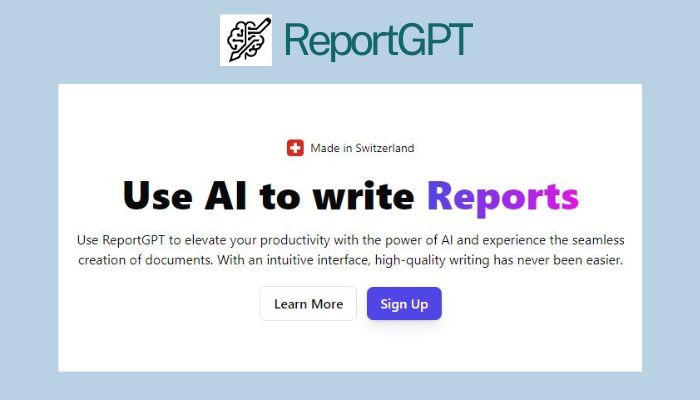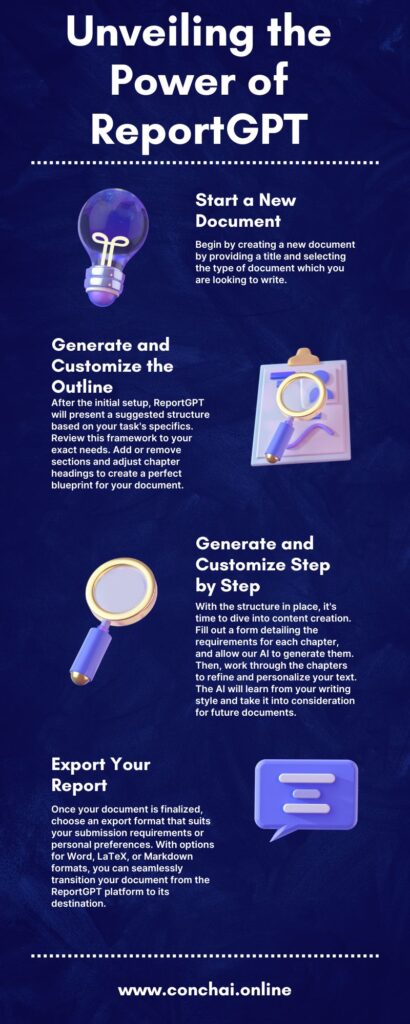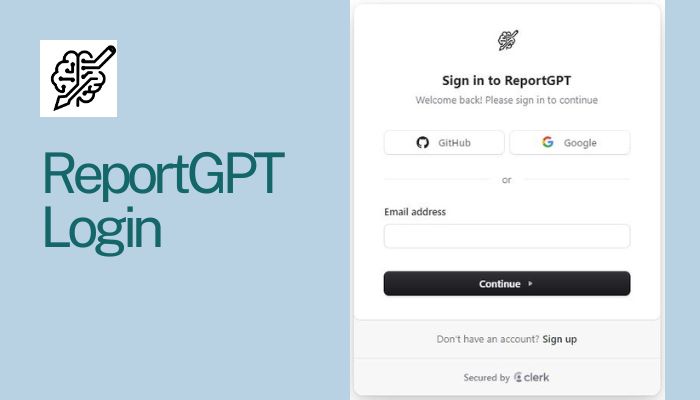The way we write reports, essays, and research papers is undergoing a significant transformation. Manual document creation, often a time-consuming and tedious process, is being challenged by innovative AI writing tools like ReportGPT. This platform leverages the power of artificial intelligence to streamline your writing process, offering features that can significantly improve efficiency and quality.
This article delves into the world of ReportGPT, exploring its functionalities, benefits, and potential implications. We’ll analyze how this tool can reshape your approach to writing various documents, from academic papers to business plans.

Unveiling the Power of ReportGPT
ReportGPT’s core strength lies in its ability to automate and simplify document creation through a user-friendly interface and AI-driven assistance. Let’s explore its key features:
- Document Templates and Outlines: ReportGPT provides a library of customizable templates for different document types, including research papers, essays, business reports, and more. These templates offer a structured framework to guide your writing, ensuring a logical flow and adherence to specific formatting requirements.
- AI-powered Content Generation: The platform boasts a robust AI engine that assists with content creation. You can provide keywords, data points, or outlines, and ReportGPT will generate text suggestions that seamlessly fit within the chosen template. This feature can significantly reduce writing time and overcome writer’s block by providing a starting point or filling in gaps within your content.
- Form-Driven Data Entry: ReportGPT integrates a user-friendly system for data entry through forms. This allows you to efficiently input key information for your document, like research findings, statistical data, or business metrics. The platform then seamlessly incorporates this data into the relevant sections, maintaining consistency and accuracy.
- Research Support: For academic writing tasks like research papers, ReportGPT offers valuable support tools. It can help organize your research findings and ensure proper citation formatting, saving you significant time and effort.
- Content Refinement and Collaboration: While ReportGPT generates text suggestions, the final product remains under your control. You can refine the generated content, ensure accuracy, and maintain your writing style. This collaborative approach fosters efficiency and allows you to leverage AI assistance without losing your unique voice.
- Multiple Export Formats: Once you’ve finalized your document, ReportGPT offers a variety of export options. You can choose a format that best suits your requirements, such as Word, PDF, or plain text, enabling seamless integration with your existing workflow.

Benefits of Utilizing ReportGPT
Integrating ReportGPT into your writing process offers a multitude of benefits for individuals and organizations alike.
- Increased Efficiency: ReportGPT significantly reduces document creation time. By utilizing pre-built templates, AI-generated content suggestions, and efficient data entry, you can complete reports and essays much faster. This allows you to devote more time to research, analysis, and refinement of your content.
- Improved Quality and Consistency: The structure provided by templates and AI suggestions can lead to a more polished and consistent final product. ReportGPT ensures adherence to formatting guidelines and helps maintain a logical flow throughout the document.
- Overcoming Writer’s Block: The AI-powered content generation feature can be a game-changer for those facing writer’s block. ReportGPT provides starting points and suggestions, helping you overcome mental hurdles and break through creative roadblocks.
- Enhanced Research Support: For academic writing, ReportGPT provides invaluable research assistance. The platform facilitates data management and ensures proper citation formatting, saving valuable time while ensuring accuracy.
- Accessibility and Customization: ReportGPT is a user-friendly platform that is accessible to individuals with varying writing skills. The customizable templates and content generation features cater to different levels of expertise, allowing you to tailor your experience to your needs.

Considerations and Potential Concerns
While ReportGPT offers a compelling solution for document creation, it’s important to consider potential concerns:
- Overdependence on AI: It’s vital not to rely solely on AI-generated content. While suggestions can be helpful, critical thinking and editing remain crucial to ensure accuracy, originality, and a distinct writing style.
- Plagiarism Risks: Machine-generated text might inadvertently contain plagiarism. It’s essential to properly cite sources and to paraphrase information before incorporating it into your document.
- Ethical Considerations: The use of AI writing tools in academic settings raises ethical concerns regarding plagiarism and authenticity. It’s essential to use ReportGPT responsibly and ensure that human understanding remains paramount.
The Future of ReportGPT and AI-Powered Writing
As AI technology continues to advance at a rapid pace, tools like ReportGPT are poised to become even more indispensable for writers and researchers. The future holds exciting possibilities for how these platforms can reshape the writing landscape.
Enhanced AI Capabilities
- Deeper Understanding of Context: Future iterations of ReportGPT could possess a more profound comprehension of context, allowing for more nuanced and tailored content generation. The AI could analyze complex datasets, identify patterns, and generate insights that go beyond simple data summarization.
- Style and Tone Customization: Users might have greater control over the style and tone of the generated content. This could include options to match specific writing styles (e.g., academic, journalistic, persuasive) or to emulate the writing style of particular authors.
- Multilingual Capabilities: Expanding ReportGPT to support multiple languages would broaden its accessibility and utility for a global audience.

Integration with Other Tools
- Seamless Collaboration: Integration with popular productivity and collaboration tools (like Google Docs, and Microsoft Teams) could streamline the writing process and facilitate teamwork.
- Data Visualization: Visualizing complex data within the document could enhance understanding and impact. ReportGPT could integrate with data visualization tools to generate charts, graphs, and infographics.
- Real-time Feedback: Providing real-time feedback on grammar, style, and clarity could help users improve their writing skills as they work.
Ethical Considerations and Responsible AI
As AI writing tools become more sophisticated, it’s crucial to address ethical concerns and ensure responsible AI development. This includes:
- Transparency: Clearly communicating the limitations and capabilities of AI-generated content to users.
- Bias Mitigation: Actively working to reduce biases in the AI models to prevent discriminatory or harmful outputs.
- Data Privacy: Protecting user data and ensuring compliance with privacy regulations.
Impact on Education and Research
ReportGPT and similar tools have the potential to revolutionize education and research. By automating mundane tasks, students and researchers can focus on higher-order thinking, critical analysis, and creativity. However, it’s essential to strike a balance between AI assistance and the development of essential writing and research skills.
Conclusion
ReportGPT represents a significant step forward in the evolution of writing tools. As AI technology continues to mature, we can anticipate even more powerful and versatile platforms that will redefine how we create and consume content. By embracing these tools responsibly and ethically, we can harness their potential to enhance creativity, productivity, and knowledge dissemination.
